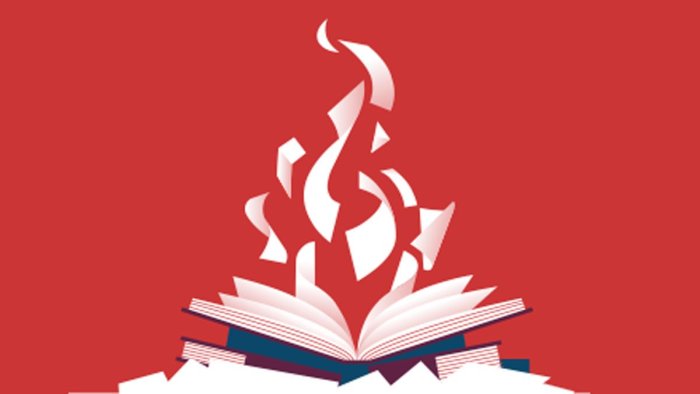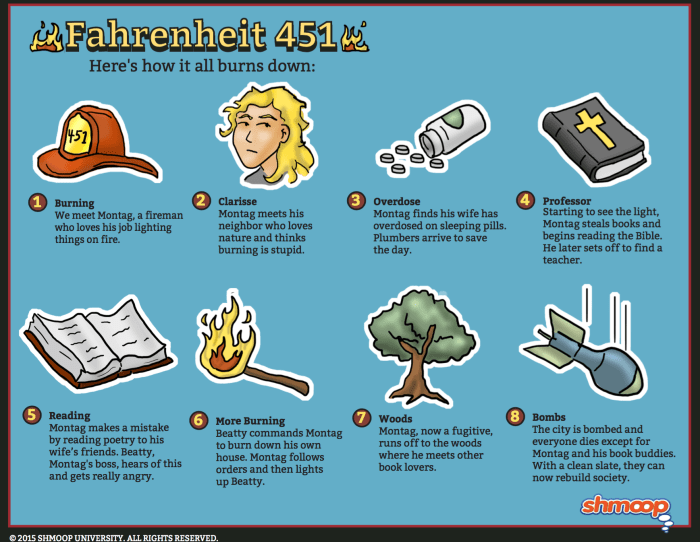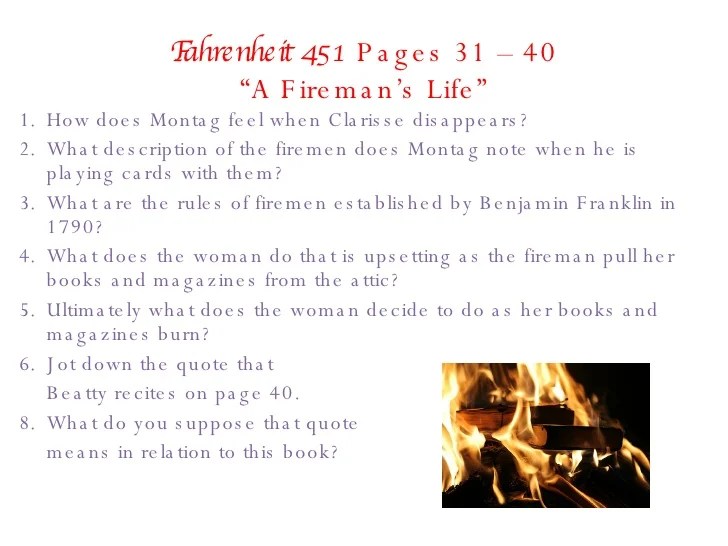Embark on an intriguing journey with our Fahrenheit 451 Chapter 2 Quiz, where we delve into the dystopian world of Ray Bradbury’s masterpiece. This quiz will ignite your curiosity and guide you through the novel’s exploration of censorship, technology, and the power of individuality.
In this chapter, we encounter Montag, a conflicted fireman, and Clarisse McClellan, a free-spirited teenager who challenges his perception of society. We witness the chilling effects of censorship and the dangers of a society that suppresses knowledge.
Character Analysis
In Fahrenheit 451, Ray Bradbury creates a cast of complex characters who navigate a dystopian society where books are outlawed and critical thinking is discouraged. Among them, Montag, Clarisse McClellan, and Captain Beatty stand out as central figures whose interactions shape the narrative and explore the themes of the novel.
Montag, Fahrenheit 451 chapter 2 quiz
Montag, the protagonist of the novel, is a fireman tasked with burning books and enforcing the oppressive laws of the society. Initially, he is a detached and apathetic individual who blindly follows orders without questioning the consequences of his actions.
However, an encounter with Clarisse McClellan sparks a gradual awakening within him, leading him to doubt the validity of the society he lives in.
Montag’s transformation is driven by his growing curiosity and dissatisfaction with the superficiality and emptiness of his life. Through Clarisse’s influence, he begins to question the government’s propaganda and the suppression of knowledge. As he delves deeper into the world of books, he realizes the importance of critical thinking and the power of words to shape human consciousness.
Themes

In Fahrenheit 451, censorship is a pervasive force that shapes society. It is a tool used by the government to control information and suppress dissent. Books, which contain dangerous ideas, are forbidden and burned. The firemen, who are responsible for enforcing censorship, are feared and respected.
They have the power to destroy knowledge and silence voices of opposition.
Censorship has a profound impact on society. It creates a culture of fear and ignorance. People are afraid to express their opinions or read forbidden books. They become passive and compliant, accepting the government’s version of reality without question. Censorship also stifles creativity and innovation.
Without access to new ideas, society stagnates and progress is impossible.
Technology and Society
Technology plays a complex role in Fahrenheit 451. On the one hand, it is a tool that can be used for good. The firemen’s salamanders, for example, are used to put out fires and save lives. On the other hand, technology can also be used for evil.
The government uses the media to spread propaganda and control the population. The firemen’s flamethrowers are used to burn books and destroy knowledge.
Technology has the potential to both empower and enslave. It can be used to connect people and share information, but it can also be used to isolate people and control their thoughts. In Fahrenheit 451, technology is a double-edged sword that can be used for both good and evil.
Individuality and Rebellion
In a society where censorship is rampant, individuality is a dangerous thing. Those who dare to think for themselves and question the government are often punished. Montag, the protagonist of Fahrenheit 451, is one such individual. He begins to question the society he lives in and the role he plays in it.
Fahrenheit 451 Chapter 2 Quiz is a valuable resource for students looking to test their understanding of the novel’s themes and characters. In addition, students preparing for their Algebra 2 Pre-Test can find helpful resources like the algebra 2 pre-test answer key online.
Returning to Fahrenheit 451 Chapter 2 Quiz, it offers multiple-choice questions and essay prompts that delve into the novel’s exploration of censorship, knowledge, and individuality.
He steals books and reads them in secret. He meets other rebels who share his beliefs. Together, they plot to overthrow the government and create a new society where freedom of thought is valued.
Montag’s rebellion is a dangerous one. He knows that he could be killed for what he is doing. But he is willing to risk his life for what he believes in. He believes that everyone has the right to think for themselves and read whatever they want.
He believes that censorship is wrong and that it must be stopped.
Setting

The dystopian society depicted in Fahrenheit 451 is a chilling vision of a future where books are banned and critical thinking is discouraged. The government controls every aspect of citizens’ lives, from what they read to what they think. People live in constant fear of being reported for any sign of nonconformity.
The Significance of the Setting
The setting of Fahrenheit 451 plays a crucial role in shaping the characters and the plot. The oppressive atmosphere of the society forces the characters to make difficult choices about their lives and beliefs. The ban on books symbolizes the government’s desire to control the flow of information and prevent people from forming their own opinions.
Symbolism and Imagery
The novel is rich in symbolism and imagery that reinforces the themes of censorship and oppression. The burning of books represents the destruction of knowledge and the suppression of free thought. The fire also symbolizes the government’s power to control and manipulate its citizens.
Plot Summary

Chapter 2 of Fahrenheit 451introduces Montag’s wife, Mildred, and delves into their troubled relationship. It also sets the stage for Montag’s growing disillusionment with his society and his job as a “fireman.”
Mildred’s Character
Mildred is a superficial and detached woman who is addicted to the parlor walls and Seashell Radio, which provide her with a constant stream of mindless entertainment. She is disconnected from her emotions and has little interest in her husband or the world around her.
Montag’s Inner Conflict
As Montag observes Mildred’s behavior, he begins to question his own values and beliefs. He realizes that he is living a shallow and unfulfilling life. The encounter with Clarisse McClellan in the previous chapter has planted a seed of doubt in his mind, and now he finds himself at a crossroads.
The Mechanical Hound
Montag’s inner turmoil is further fueled by the arrival of the Mechanical Hound, a fearsome robot that symbolizes the oppressive nature of the society. The Hound’s presence serves as a constant reminder of the danger that Montag faces if he steps out of line.
Turning Point
The chapter culminates in a pivotal moment when Montag discovers a hidden book under his pillow. This discovery marks a turning point in the novel as it sets Montag on a path of rebellion and self-discovery.
Contribution to the Narrative
Chapter 2 plays a crucial role in establishing the characters and themes of the novel. It introduces Mildred as a foil to Montag, highlighting his growing dissatisfaction with his life. It also foreshadows the dangers that Montag will face as he challenges the society’s norms.
Symbolism and Imagery

Chapter 2 of Fahrenheit 451 is rich in symbolism and imagery, which enhance the novel’s themes and create a vivid and memorable reading experience.
The Burning of Books
The burning of books is a central symbol in the novel. It represents the suppression of knowledge, ideas, and freedom of thought. The firemen’s task is to destroy books, ensuring that people remain ignorant and unable to question the established order.
The burning of books also symbolizes the destruction of history and culture, as it wipes out the collective knowledge and wisdom of the past.
Color and Light
The use of color and light in Chapter 2 also contributes to the novel’s symbolism. The firemen’s uniforms are black, which suggests darkness, secrecy, and the suppression of knowledge. In contrast, the books that the firemen burn are often described as being bright and colorful, representing the light of knowledge and the beauty of ideas.
The contrast between black and color symbolizes the struggle between ignorance and enlightenment.
Literary Devices

Chapter 2 of Fahrenheit 451 showcases various literary devices that enhance the narrative and convey deeper meanings.
Foreshadowing and Irony
Foreshadowing hints at future events, while irony presents a contrast between expectation and reality. In Chapter 2, Bradbury employs these devices to create a sense of impending doom and highlight the dystopian nature of the society.
- Foreshadowing:The frequent references to the “mechanical hound” foreshadow the threat it poses to Montag and the dangers of the dystopian society.
- Irony:The firemen’s role in burning books, symbols of knowledge and enlightenment, is ironically juxtaposed against their duty to protect society.
Figurative Language
Bradbury uses figurative language to create vivid imagery and evoke emotions in the reader.
- Metaphor:“Her face was like a mask” compares Clarisse’s face to a mask, highlighting her hidden thoughts and feelings.
- Simile:“Her face was like a pale flower” likens Clarisse’s face to a flower, suggesting her fragility and beauty.
- Personification:“The wind blew cool” attributes human qualities to the wind, creating a sense of foreboding.
Character Relationships
The complex web of relationships in Fahrenheit 451shapes the characters’ actions and motivations.
Montag and Mildred
Montag and Mildred’s marriage is characterized by a lack of genuine connection. Mildred is preoccupied with her technology, while Montag feels increasingly isolated and unfulfilled. Their relationship highlights the negative effects of a society that values instant gratification and discourages intellectual pursuits.
Montag and Faber
Faber is a retired English professor who becomes Montag’s mentor and confidant. He represents the intellectual side of society that has been suppressed by the government. Montag’s encounter with Faber ignites his passion for literature and challenges his unquestioning acceptance of the status quo.
Montag and the Other Firemen
Montag’s relationship with his fellow firemen is initially one of camaraderie. However, as Montag begins to question the society he serves, he realizes that his colleagues are mere pawns in a system that suppresses individuality and critical thinking. Their loyalty to the Fire Department and their acceptance of censorship ultimately lead to Montag’s alienation from the group.
Table of Chapter Events
Chapter 2 of Fahrenheit 451 presents a series of significant events that shape the protagonist’s journey. The following table summarizes these key events, their significance, and the corresponding page numbers:
| Event | Significance | Page Number |
|---|---|---|
| Montag meets Clarisse McClellan | Clarisse’s free-thinking and unconventional nature challenges Montag’s rigid worldview. | 20 |
| Montag experiences Clarisse’s laughter | Clarisse’s genuine laughter awakens Montag’s dormant emotions and sparks his curiosity about the world beyond his monotonous existence. | 22 |
| Montag questions his own beliefs | Clarisse’s influence prompts Montag to question the society’s emphasis on conformity and the suppression of individuality. | 24 |
| Montag steals a book from the burning house | This act symbolizes Montag’s growing rebellion against the oppressive system and his desire for knowledge and freedom. | 31 |
| Montag encounters Faber | Faber becomes Montag’s mentor and guide, providing him with intellectual and emotional support in his journey of self-discovery. | 45 |
Quotation Analysis: Fahrenheit 451 Chapter 2 Quiz

In Chapter 2 of Fahrenheit 451, Montag’s encounter with Clarisse McClellan sparks a profound realization about the shallowness of his life. This encounter is marked by a significant quotation that encapsulates the novel’s central themes of censorship, individuality, and the search for meaning.
Quotation Context and Meaning
When Montag asks Clarisse why she is so different from others, she replies:
“I’m antisocial, they say. I don’t mix. It’s so strange. I’m very social indeed. What I hate is the way people meet, and don’t look at one another.”
This quotation reveals Clarisse’s keen observation of society’s superficial interactions. She recognizes that people are more concerned with following societal norms and conforming to expectations than with genuine human connection.
Relevance to Chapter Themes
Clarisse’s words resonate deeply with Montag’s growing disillusionment with his life as a fireman. He has come to realize that his job of burning books and suppressing knowledge is ultimately a destructive and meaningless act. Clarisse’s perspective challenges Montag’s complacency and forces him to question the values and beliefs that have shaped his society.
Relevance to Characters
The quotation also foreshadows Montag’s transformation throughout the novel. Clarisse’s non-conformist spirit and her ability to see the beauty in the world inspire Montag to break free from the oppressive society he has known. Her words serve as a catalyst for Montag’s journey towards self-discovery and enlightenment.
FAQ Section
What is the significance of the burning of books in Fahrenheit 451?
The burning of books symbolizes the suppression of knowledge and the control of information by the government. It represents the fear of ideas and the desire to maintain a docile and unquestioning society.
How does Clarisse McClellan influence Montag?
Clarisse’s free-thinking and inquisitive nature challenges Montag’s complacency and opens his eyes to the emptiness of his existence. She inspires him to question authority and seek out genuine experiences.
What is the role of Captain Beatty as a representative of society?
Captain Beatty represents the oppressive forces of society that seek to maintain control through censorship and fear. He is a mouthpiece for the government’s propaganda, justifying the suppression of knowledge as necessary for social order.